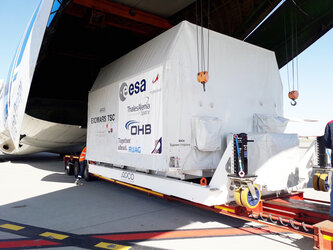

Destination Mars
Mars may once have been much more like Earth, with conditions that may have been suitable for life.
Launched in 2003 and still operating today, ESA’s Mars Express mission has shown that liquid water once flowed on the Red Planet, altering its geology. It has also found evidence for methane in its atmosphere, which on Earth is produced by life, as well as natural gas reservoirs and volcanic activity.
ExoMars, a joint programme with Roscosmos, is continuing Mars exploration and the search for life. A first mission launched in 2016 is making detailed, remote observations of the martian atmosphere, searching for evidence of methane and other trace atmospheric gases that could be signatures of active biological or geological processes.
A second mission will deploy a European rover that will travel across the martian surface to search for signs of life underground, where it is better protected from the harsh radiation environment. It will collect samples with a drill and analyse them with cutting-edge instruments.





